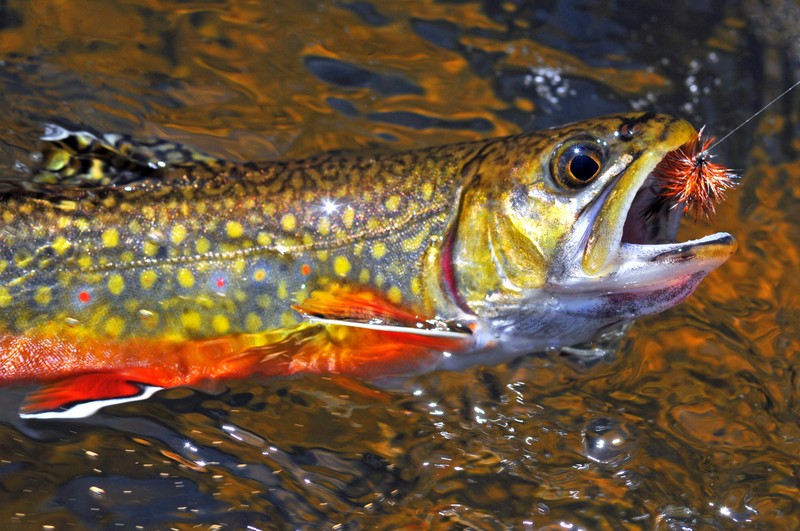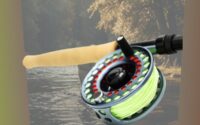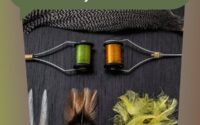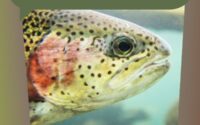| Disclosure: Just to be open and honest the buttons and links you click on in the website will in most cases take you to another website where you can purchase the products I am reviewing. As an Amazon Associate I earn from qualifying purchases. |
Beginner Fly Fishing Tips

As a beginner there are loads of things you need to learn to become a better fly angler. Apart from the initial setting up of your fly rod there are a list of things to consider to make your learning a bit smoother. After all what we want to do is catch fish and anything that can improve that is worth reading so here are my beginner fly fishing tips I hope you find them useful.
Quick Post Navigation
Above all, Learn to cast properly!
Put in some time practicing casts with the basic overhead and roll cast from the start. Perform casting drills and get accurate in your casting and you will improve your catch rate immensely. If you can afford it getting a few casting lessons from a properly credited casting instructor will speed up that process. Its very easy to take on bad habits at the beginning while trying to teach yourself from videos or books.
A casting instructor will be able to sort these out and get you on a better path to correct efficient casting a lot quicker than you can do it yourself. The better more efficient your casting the easier it becomes as you use less energy and can fish for longer without becoming fatigued. So its well worth doing a bit of practice before hand you will be happy you did.
When learning how to cast properly it’s important not to try and cast too far to early in the process. Learn to cast with accuracy and efficiency to the water closest to you before trying to reach 30 yards casts. That distance will come with time but there is a lot of water between the tip of your rod and a 30 yard cast and believe me it will hold fish so cast to them and work that water properly.
I see too many anglers trying for distance early in the process and getting frustrated because they are not adept enough to present quality casts to the fish at those distances but are making loads of splashing and disturbances which mean few to no takes. A big mistake.
Learn how to read the water, watercraft!
Learn watercraft early on. Don’t think its just OK to cast a fly out into the water. Look at the flow of the river and try to visualize where the fish will be lying. Underwater obstacles, overhanging bushes, differences in depth, slower flows etc all will hold fish were stale water or very fast flowing will most likely hold no fish.
Learn where the fish are to be able to present to them correctly without spooking them by casting over them. Local knowledge is excellent when trying a new beat, being told where the usual taking spots are helps get you mind set for takes. However treat every cast as a possible taking zone you will be surprised how often a fish takes when we least expect it.
Check in with the local tackle shop before hitting a beat or pool ask how the fishing is going, has there been any big catches, what flies are being used any tips or places to try. You will be surprised what you can learn at these places if you treat them with respect and buy something first. You don’t have to spend a lot even a few flies to add to the fly box can put the tackle dealer in a better mood to let slip the good or hot places on the river.
Its not a time to party!
Stealthiness on the bank side is most important. Stomping about and making loads of noise will only scare all the fish to the other side of the lake or to the next pool on a river. If fishing with noisy buddies tell them to be quiet or your days fishing will be useless. When approaching a fishing pool it is better to move down slowly making as little noise as possible.
This can also be said for wading don’t splash about in the water try to move with slow stealthy steps (which at times can be difficult with slippy rocks etc) but try to do it as best as possible. The quieter you are the better your chances are of making catches. I have in the past been wading in the water standing absolutely still while watching fish pass by my waders on there way up stream as if totally oblivious to my presences. This was only possible by my quietness and gentle casting.
Try not to perform false casts over and over. Its more energy efficient to perform no false casts but retrieve to the loading position and make one cast to put your flies back into the pool ready for the next drift. I have watched new anglers making false cast after cast with their flies passing back and forth in the air.
Remember you cannot catch a fish if you flies are airborne they need to be in the water. 🙂 Apart from that the constant false casting passes shadows across the fish lies and can make them very nervous. When possible I try to get my flies out in one go.
Learn different retrieves and as you progress down a pool try different ones to see if you can induce a take. Sometimes the fish want it slow and steady other times they need a fast presentation. Having the ability to make different retrieves can help improve your catch rates. There are loads to learn, the figure of eight, the roly poly, the strip and many combinations learning these and others will increase your catch rate also.
At all times be safe wear eye-wear. Get polarized sunglasses or prescription ones if you already need glasses. The ability to see into the water on sunny days will increase your ability to see where the fish are lying and the excitement that is received when a trout or fish chases your fly is amazing.
Sight stalking your target species is amazing and gives me a thrill like no other. Not only are glasses great for seeing the fish they will protect your eyes from loose casting or a gust of wind that sends them towards you. I would also wear a baseball cap or similar to protect my head. I have on occasions caught a fly in it which could have been buried in my head. Not too nice. I have seen it happen and the cries of pain from someone getting a fly pulled out is not worth the risk .
Be safe on the river its a sport not life!
Other safety equipment required is a wading staff if wading in rocky conditions or on a beat you are unused too and a life jacket if you are not a good swimmer or nervous in water. I don’t use a life jacket on the river but I don’t wade in water I’m not used too or on my own. If out in a boat lake fishing then I always use a life jacket. Also if a river is in flood don’t wade when you cannot see the bottom. One slip can leave you washed downstream very quickly.
Make sure to carry nippers and forceps being able to cut leader material quickly and straight is very important. I see too many anglers using their teeth which is harmful to your teeth and doesn’t give a good straight edge. When using small flies it is almost impossible to eye the fly with uneven leader. A set of good quality nippers will make that task a lot easier.
Forceps are required to help take the fly out of the fish when you have caught it. If practicing catch and release tactics then its important to not handle the fish too much and get the fly out as quickly as possible. I would also use barbless hook here too to help do this. You will be amazed hook deep a hook can penetrate a fish mouth and if you struggle to take the hook out the likelihood of that fish returning safely is diminished dramatically . Forceps are not expensive and are easily carried so make sure you have a pair on hand.
While fishing make sure to check your leader often. Its not difficult to retrieve your files and give them the once over every once and a while look at the knots to see if they are still straight and not kinked, check the leader for wear, wind knots and kinks. All these will weaken it and may lose you a fish when the next one takes. You don’t want to loose a fish of a lifetime because of weak knots or damaged leader material. We can all become lazy and reuse a leader over and over again from fishing trip to trip I am guilty too. However if we don’t keep checking it you are asking for trouble.
There you have my beginner fly fishing tips there are loads more and I could go on but for now I think that is more than enough to get into your arsenal. Remember practice and get your casting correct you will enjoy the sport a lot more.



I thoroughly enjoyed this article and had no idea there was so much ado to casting a line in the water! Wow! It’s a wonderful work that shows some very down-to-earth tips on fishing more safely and successfully! So many people do not realize that the world we’re in and the world the fish are in are connected, and like we can see in, they can see out!
Hey Daniel, thanks for the praise on the post. Yes its a wonderful world and we are connected to all of it including the fish. Nothing more enjoyable to me than casting a fly line out into a river and waiting for the take. Marvelous!